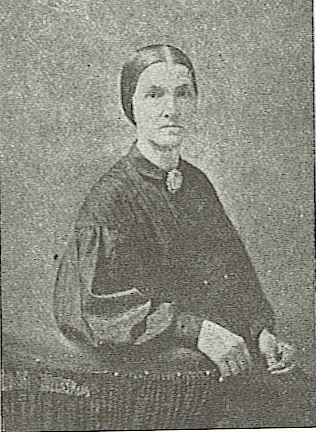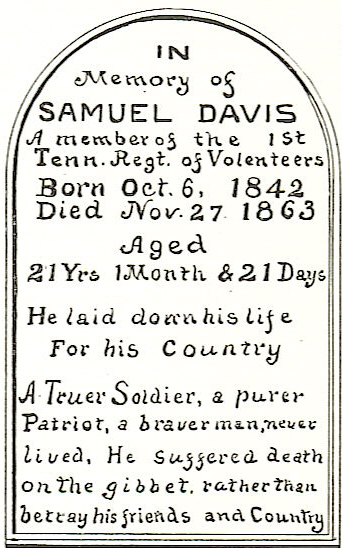
 AN ADDRESS BY AN EX-CONFEDERATE SOLDIER TO THE GRAND
AN ADDRESS BY AN EX-CONFEDERATE SOLDIER TO THE GRAND
ARMY OF THE REPUBLIC
by Maurice Thompson
(1844-1901)
I was a rebel, if you please,
a reckless fighter to the last,
Nor do I fall upon my knees
and ask forgiveness for the past.
A traitor? I a traitor? No!
I was a patriot to the core;
The South was mine, I loved her so,
I gave her all,–I could no more.
You scowl at me. And was it wrong
To wear the gray my father wore?
Could I slink back, though young and strong,
From foes before my mother’s door?
My mother’s kiss was hot with fight,
My father’s frenzy filled his son,
Through reeking day and sodden night
My sister’s courage urged me on.
And I, a missile steeped in hate,
Hurled forward like a cannonball
By the resistless hand of fate,
Rushed wildly, madly through it all.
I stemmed the level flames of hell,
O’er bayonet bars of death I broke,
I was so near when Cleburne fell,
I heard the muffled bullet stroke!
But all in vain. In dull despair
I saw the storm of conflict die;
Low lay the Southern banner fair
And yonder flag was waving high.
God, what a triumph had the foe!
Laurels, arches, trumpet-blare;
All around the earth their songs did go,
Thundering through heaven their shouts did tear.
My mother, gray and bent with years,
Hoarding love’s withered aftermath,
Her sweet eyes burnt too dry for tears,
Sat in the dust of Sherman’s path.
My father, broken, helpless, poor,
A gloomy, nerveless giant stood,
Too strong to cower and endure,
Too weak to fight for masterhood.
My boyhood home, a blackened heap
Where lizards crawled and briers grew,
Had felt the fire of vengeance creep,
The crashing round-shot hurtle through.
I had no country, all was lost,
I closed my eyes and longed to die,
While past me stalked the awful ghost
Of mangled, murdered Liberty.
The scars upon my body burned,
I felt a heel upon my throat,
A heel that ground and grinding turned
With each triumphal trumpet note.
“Grind on!” I cried “nor doubt that I,
(If all your necks were one and low
As mine is now) delightedly
Would cut it by a single blow!”
II
That was dark night; but day is here,
The crowning victory is won;
Hark, how the sixty millions cheer,
With Freedom’s flag across the sun!
I a traitor! Who are you
That dare to breathe that word to me?
You never wore the Union blue,
No wounds attest your loyalty!
I do detest the sutler’s clerk,
Who dodged and skulked till peace had come.
Then found it most congenial work
To beat the politician’s drum.
I clasp the hand that made my scars,
I cheer the flag my foemen bore,
I shout for joy to see the stars
All on our common shield once more.
I do not cringe before you now,
Or lay my face upon the ground;
I am a man, of men a peer,
And not a cowering, cudgeled hound!
I stand and say that you were right,
I greet you with uncovered head,
Remembering many a thundering fight
While whistling death between us sped.
Remembering the boys in gray,
With thoughts too deep and fine for words,
I lift this cup of love to-day
To drink what only love affords.
Soldier in blue, a health to you!
Long life and vigor oft renewed,
While on your hearts, like honey-dew,
Falls our great country’s gratitude.



 THE SOUTHERN MOTHER’S CHARGE
THE SOUTHERN MOTHER’S CHARGE

 Painting by Don Troiani
Painting by Don Troiani
 The Ballad of Chickamauga
The Ballad of Chickamauga Thomas F. Birchfield was a member of the 18th Light Artillery Battery of Eli Lilly during the War between the States. He enlisted on July 18, 1862 and mustered out June 30, 1865. According to his family, he was given a cannon for his heroic actions. He and a fellow soldier carried their General to safety after he had been wounded. After the war, he lived in Crawfordsville and Terre Haute. The old soldiers of Montgomery County used the cannon to celebrate the 4th of July every year. When he was on his death-bed, his wife asked him what they should do with the cannon. He said, “Put it on my grave and point ‘er south.”
Thomas F. Birchfield was a member of the 18th Light Artillery Battery of Eli Lilly during the War between the States. He enlisted on July 18, 1862 and mustered out June 30, 1865. According to his family, he was given a cannon for his heroic actions. He and a fellow soldier carried their General to safety after he had been wounded. After the war, he lived in Crawfordsville and Terre Haute. The old soldiers of Montgomery County used the cannon to celebrate the 4th of July every year. When he was on his death-bed, his wife asked him what they should do with the cannon. He said, “Put it on my grave and point ‘er south.”




 THE THOMPSON FAMILY
THE THOMPSON FAMILY
 AN ADDRESS BY AN EX-CONFEDERATE SOLDIER TO THE GRAND
AN ADDRESS BY AN EX-CONFEDERATE SOLDIER TO THE GRAND BRAXTON CASH
BRAXTON CASH